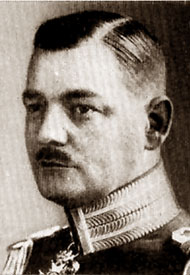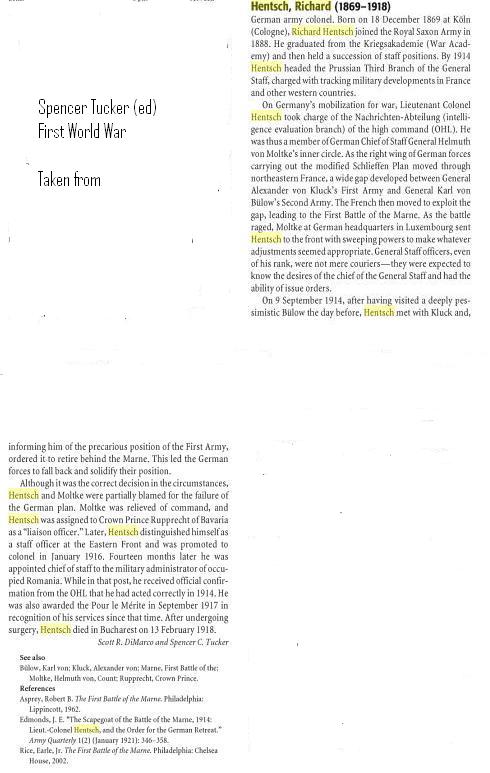The Man Who Lost Germany the Great War? December 9, 2014
Author: Beach Combing | in : Contemporary , trackbackA couple of indisputable, non-negotiable Great War facts. In early September 1914 the German army came smashing down on the French army at the Marne. In the decisive battle of the first part of the war, the French, with some assistance from the brave but plodding Brits, managed to hold the Germans. However, everyone on all sides admitted that the Marne had been a close run things. The Germans had come within (automatic) spitting distance of Paris and if the French line had been broken and German troops had pushed through to the open country beyond with the Eiffel Tower glowing in the distance… Well, would France exist today? Would there have been a Second World War? Would the European Union be a German tradesbund (but wait…)? Given the closeness of the action it is understandable that historians have looked for the cog-wheel of cause and effect that made the difference, that gave the French that extra élan or that pulled the Germans back from rottweiler-like mood of destruction. The French often get teary-eyed about the taxis on the Marne but the Germans have a far more precise moment, the moment that the German high commander, von Moltke, sent, 8 September, the pessimisitic Richard Hentsch (pictured) to inspect the first and second army. The first and second army, who were slowly breaking French resistance, were ordered by Hentsch, a mere lieutenant Colonel, to withdraw and at that point the Marne and, so the story goes, the war was lost. One of the leaders of the second army even fantasisted a generation later that, had Hentsch been shot en route by a French sniper, Germany would have been negotiating an armistice by October! There is a real chance that this judgment is right: it is supported by Holger H. Herwig, the leading historian of the Marne campaign and the man who has come closest to mastering Allied and Central Powers documentation.
First, though, some background. The first and second army were on the extreme western wing (seen from Paris) of the Schlieffen hammer, coming down from the north. By 8 September von Moltke had been out of touch with these two armies, incredible as this may seem, for two days and he sent RH as his representative to restore order. Hentsch found that the Second Army was in a difficult state and that because of carelessness of the First Army a gap had opened up between the two. His further journey to the First Army confirmed that there the situation was degenerating. RH ordered then von Bulow, head of the second army, and subsequently through a minion, von Kuhl’s first army to withdraw and hold at a more stable positon to the rear. We know now that the situation was nowhere near as bad as either Hentsch or von Bulow or von Kuhl believed and that the Germans, though they had left themselves vulnerable, as attacking armies must do, still had lots of fight and a good chance of at least holding the French. The French and British advancing from the south would certainly have been hard pressed to envelope the German lines, which was Hentsch and von Moltke’s terror. But can Hentsch really be blamed for ending the first Battle of the Marne? Of course, not. Von Moltke had chosen to send a pessimistic officer, reflecting his own mood of caution and his own fears. Von Bulow first resisted the order to retreat, but then gladly seized on it because of some (as it turned out temporary) bad news coming in. Then, neither, and this is truly incredible, von Bulow or von Kuhl tried to communicate directly with von Moltke or perhaps even more extraordinarily with each other: German communications were far inferior to Allied communications in the first part of the war.
Richard Hentsch remains a tragic figure. As he was going to inspect the Second Army he confessed to his driving companion that he was worried that he would be scapegoated whatever the outcome. He was torn by doubts (which he had not been able to express in conference) on driving away from the meeting with von Bulow. And Hentsch had called the situation wrong, but he had been put up to the job by his commanding officer and he had been aided and abetted in this by von Bulow, who was an old man past his time. The Allies could, indeed, as one American writer, Peyton C. Marsh suggested build a statue to Hentsch, but not for the man himself, who seems to have been a capable and rigorous officer with a certain sensibility under his hard Prussian carpace. Rather, they might build one to him as a representative of the German staff system that had so let down the German army and that would lose Germany the war.
Other thoughts on Richard Hentsch and the moment Germany lost the Great War: drbeachcombing AT yahoo DOT com
30 Dec 2014: Jacob Lutz writes in, ‘I was intrigued by Richard H and wanted to send you this potted but reliable biography.




